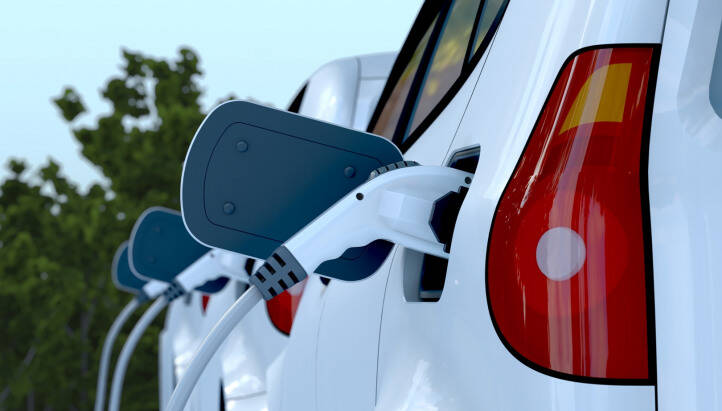Transitioning to electric vehicles (EV) doesn’t belong in the future: it’s an opportunity right now – for organisations of all shapes and sizes.

Don’t put off until tomorrow what you can do today! That’s good advice for businesses, particularly when thinking about switching to electric vehicles (EV).
Accelerating the switch to low emission vehicles is at the heart of the UK government’s 10-point plan for a green industrial revolution. Electric Vehicle technology costs are falling dramatically, which means supporting employees and customers by installing on-site workplace charging is now achievable, affordable and scalable for smaller and medium sized businesses – not just large corporations with huge fleets.
Get ahead of the curve on EV
In less than 10 years’ time, the UK government will ban the purchase of new petrol and diesel vehicles. But you can get ahead of the curve and gain commercial and environmental advantage by acting now to plan your organisation’s low carbon emissions journey. Furthermore, there are attractive cash and tax incentives for early EV adopters, including workplace charging grants of £350 (including VAT) per socket – up to a total of £14,000.
Moving to EV is a highly visible way of demonstrating your sustainability credentials and enhancing your brand and Corporate Social Responsibility. In addition, being green is becoming an essential requirement when you’re tendering for new business, so shifting to EV could also increase sales and profitability.
There are 5 compelling reasons why we believe it’s a good idea for your business to get moving with your EV plans.
1. Deliver the EV service your employees and customers want
In June 2020, there were nearly 320,000 Ultra-Low Emission Vehicles registered in the UK. That number is growing rapidly – driven mainly by business. Investment in EVs by UK businesses is set to increase by almost 50% over the next two years, exceeding £12 bn. Going forward, the National Grid forecasts that up to 10.6 million EVs could be on UK roads by 2030, rising as high as 36 million by 2040. This is evidenced by the latest sales figures for low emission vehicles, which show that sales of EVs rose 186 per cent to 108,000 units in 2020, while plug in models accounted for more than one in 10 new car sales in the UK last year.
Installing electric vehicle on-site charging at your premises such as surgeries, car parks and care homes will power up your own company vehicles and provide a valued and convenient service for the growing number of EV owners among your employees and customers. Perhaps you will extend EV charging facilities to employee homes as well as your work premises, depending on budget and where your employees will be located post COVID-19. Whatever you decide, this is a great opportunity to enhance your employees’ benefits package and improve customer retention. What’s more, there’s also scope for income generation from customers/employees to help you fund your investment in workplace charging.
2. EV workplace charging is achievable, affordable and scalable
There’s a myth that workplace charging infrastructure is only viable for large organisations and it’s too complex, disruptive and expensive for smaller businesses. That’s not true! New technology and falling costs have opened up the EV opportunity to organisations of all shapes and sizes – from companies with a couple of electric vehicles – to larger corporations with a vast low emission fleet.
By partnering with an authorised installer for the Office for Low Emission Vehicles’ (OLEV) Workplace Charging Scheme (WCS) you may be able to access government grants to:
- Help fund the cost of installing your electric vehicle charging stations
- Install on-site charging points for your own company vehicles or fleet, or for cars owned by employees and customers.
- Claim £350 (including VAT) per socket
- Eligible for up to 40 sockets, totalling £14,000
In addition, British Gas business offers its customers flexible finance options and two years interest free credit on the installation cost.
With more than 35,000 public charging points in the UK today, British Gas business and Centrica Business solutions have installed around 17,000 electric vehicle charging points and hundreds of rapid charging units for homes and businesses across all sectors. We take a joined-up approach to developing future-proofed workplace charging stations and fully integrated EV enablement solutions for our customers.
3. Transitioning to EV means lower running costs
With government funding for workplace charging, combined with other tax efficiencies, there are major financial incentives to implement your EV plans sooner rather than later. You don’t need to make any upfront capital investment in charging facilities and can shift to an operating cost model.
The EV market is developing fast to meet growing demand. Prices are falling to rapidly achieving parity with petrol and diesel motoring, especially when you factor in all long-term running costs and much lower ‘fuel’ costs.
- Other running costs, such as maintenance, are lower due to EVs having fewer mechanical parts that are prone to failure
- Data insights from your electric vehicle apps can inform a proactive maintenance strategy, resulting in fewer breakdowns
4. Switching to EV is good for the environment and avoids green taxes
EV is a key plank of the government’s 10-point green recovery plan and Energy White Paper. This includes a proposal to ban the purchase of new fossil-fuel vehicles by 2030, so it makes sense to take early action in preparing for electrification. Another key driver for EV uptake is the plan for many more UK cities to establish Ultra Low Emission Zones, following London’s lead.
The UK’s legal commitment to net zero 2050 and growing concerns about air pollution are driving increasing controls and targets on greenhouse gas emissions. Many fleet managers are considering EV adoption due to concerns over compliance with laws and regulations.
Switching to EV can benefit your business by:
- Supporting your CO2 and NO2 emissions reduction targets
- Exempting you from financial penalties and green taxes, e.g. Ultra-Low Emission Zone charges
- Helping you to gain compliance with initiatives such as the Energy Savings Opportunities Scheme (ESOS)
- Supporting your company reporting requirements, such as Streamlined Energy and Carbon Reporting (SECR)
- Generating revenue streams from customer/employee charging
Choose 100% renewable electricity for added carbon savings
Whilst electrifying your vehicles unlocks opportunities to reduce your carbon footprint and meet carbon reporting obligations, you should also consider switching to a green business energy tariff, where the electricity supplied comes from 100% renewable sources as certified by the Carbon Trust.
And, if your business is ready to go further, you may even consider generating and storing your own low or zero carbon energy on-site, using solar and battery storage to drive down energy costs and increase energy efficiency across your entire organisation, while opening up a potential income stream through energy optimisation schemes.
5. Be an environmental leader and boost your green brand reputation
Transport is the UK’s biggest emitter of greenhouse gases, accounting for 28% of all carbon emissions. Petrol and diesel vehicles also pollute the air with nitrogen dioxide (NO2), which is a serious problem – particularly in urban areas.
Electric vehicles are crucial to decarbonising transport and improving air quality. Shifting your business to EV can make a big contribution to cleaning up the environment and to your own carbon reduction targets.
Using electric vehicles in your business and installing on-site charging is a highly visible statement that you are a green business leader, and sustainability and carbon emissions are key decision-making factors for customers, so it’s a great opportunity to enhance your brand reputation, gain competitive advantage and win respect from all your stakeholders.
Leading by example
We’ve been busy integrating EV charging into businesses since 2012 when we adopted electric in our own commercial fleet. See how other businesses have been implementing their workplace charging capability and how you can switch to electric vehicles in 2021 easily and affordably.
See what other businesses have done and how your business can switch to electric vehicles in 2021 easily and affordably.
N.B. The information contained in this entry is provided by the above supplier, and does not necessarily reflect the views and opinions of the publisher


